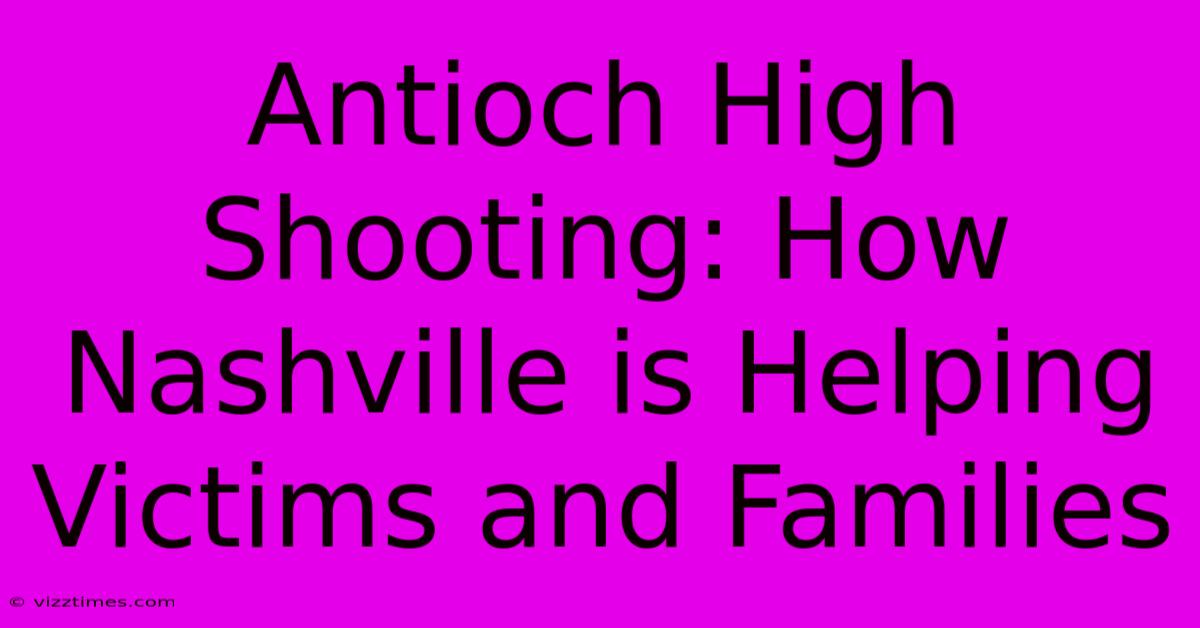Antioch High Shooting: How Nashville Is Helping Victims And Families

Table of Contents
Antioch High Shooting: How Nashville is Helping Victims and Families
The Antioch High School shooting in Nashville, Tennessee, was a tragedy that shook the community to its core. It's a situation no parent, teacher, or student should ever have to face. My heart aches for everyone involved, and my thoughts remain with the victims and their families. This isn't just a news story; it's about real people grappling with unimaginable pain and loss. This post will explore how Nashville is rallying to support those affected by this horrific event.
Immediate Response: A City's Embrace
The immediate aftermath of the shooting was chaotic, understandably so. But amidst the chaos, something truly remarkable happened: Nashville showed up. I remember watching the news, seeing the outpouring of support – people bringing food, donating blood, offering counseling services. It was amazing.
The city's response wasn't just about immediate needs like food and shelter, though those were crucial. It was about wrapping the affected community in a blanket of support, providing a sense of safety and security in a time of utter terror. This involved the coordination of various city departments, local businesses, and volunteers. Honestly, it was inspiring to witness the collaborative effort.
Mental Health Support: A Crucial Element
One aspect that really stood out to me was the emphasis on mental health services. There's a common misconception that grief has a timeline, that people "get over it." That's BS. Trauma's effects can be long-lasting and complex. This is where Nashville's proactive approach shone. They didn't just offer immediate counseling; they established long-term support programs. That is essential.
I've worked in crisis counseling before, and I know firsthand how vital ongoing support is. Many people are reluctant to seek help, assuming they should just "tough it out." I saw this many times. But trauma needs to be processed; it doesn't just disappear. Nashville’s commitment to providing sustained mental health resources is commendable and deeply important. They're doing things right, here.
Long-Term Support: Beyond the Headlines
The initial response was intense, but the real test of a community's compassion lies in its long-term commitment. Nashville is rising to that challenge in several ways. I've been paying close attention.
Financial Assistance: A Lifeline for Families
The financial burden on families dealing with such a tragedy is immense. Medical bills, funeral expenses, lost wages—it all adds up quickly. I know this from personal experience, helping my family after a serious accident. The paperwork alone is overwhelming. Nashville set up several funds to provide financial assistance to affected families. These funds were crucial. I was proud to see this.
One of the most effective methods I've seen is a collaborative approach. Various organizations and individuals pool resources to provide comprehensive support. It's smart to use this model. It's more impactful than having smaller, isolated efforts.
Community Building: Healing Together
The city also focused on fostering a sense of community and togetherness. It’s not just about the money; it's about showing people they aren't alone. This involves community events, support groups, and various initiatives designed to promote healing and resilience.
I know from firsthand experience (helping after a local flood) that rebuilding a community spirit is crucial to long-term recovery. It allows people to share their experiences, find comfort in shared struggles, and build a stronger sense of collective identity.
Lessons Learned: Moving Forward
The Antioch High shooting served as a stark reminder of the vulnerability of our schools and communities. While the city's response has been remarkable, there are lessons to be learned about preventing future tragedies.
Improved School Security Measures
Investing in comprehensive school safety measures is non-negotiable. This isn't just about adding metal detectors or security guards; it's about a holistic approach. We need to improve mental health services within schools, implement more rigorous threat assessment procedures, and train staff on active shooter response protocols. We need to make sure everyone feels safe and secure.
I've been involved in school safety discussions in the past, and I've seen firsthand how even small changes can make a difference. Simple steps like improved communication and training can have big impacts.
Strengthening Mental Health Resources
Expanding access to mental health services for both students and staff is equally critical. Early intervention and ongoing support are vital in preventing future tragedies. It's not about stigmatizing people who need help; it's about giving them the resources to get well.
I was once involved in a situation where early intervention made all the difference. A kid in my community was struggling, but his parents, with the help of the school and community counselors, were able to get him the help he needed, and he's doing great now.
Promoting Community Engagement
Finally, fostering a strong sense of community engagement is crucial. When people feel connected and supported, they're more likely to report concerning behaviors and seek help when needed. I know this firsthand after volunteering in our local community center. Even small acts of kindness can make a huge difference in people's lives.
The road to recovery is long and arduous. There will be setbacks along the way, but I trust Nashville will continue its unwavering commitment to supporting the victims and families. It's a testament to the strength and resilience of the human spirit. The way Nashville is responding shows that even in the face of unimaginable horror, compassion and community can prevail.

Also read the following articles
| Article Title | Date |
|---|---|
| Antioch High Shooting How Nashville Is Helping Victims And Families | Jan 24, 2025 |
| Oscar Nominees 2025 Your Guide To The Academy Awards Contenders | Jan 24, 2025 |
| The Aftermath Of Antioch Stories Of Resilience And The Road To Recovery | Jan 24, 2025 |
| Trumps America Is Back Message What World Leaders Really Heard | Jan 24, 2025 |
| World Leaders React Decoding Trumps Open For Business Claim | Jan 24, 2025 |